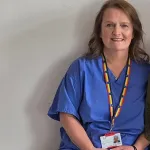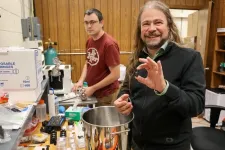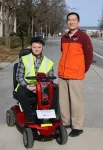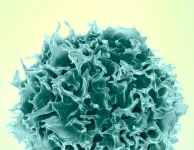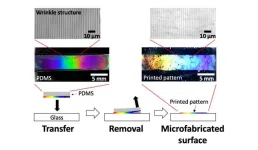(Press-News.org) Groundbreaking research exploring the experiences of autistic psychiatrists has revealed that psychiatrists who are unaware that they themselves are autistic may fail to recognise the condition in their patients. The study, conducted by researchers from University College Dublin, London South Bank University, Brighton and Sussex Medical School, is the first of its kind to delve into the lives of neurodivergent psychiatrists. It was published today in BJPsych Open.
"Knowing that you are autistic can be positively life-changing," said the study author Dr Mary Doherty, Clinical Associate Professor at UCD School of Medicine. "However, more than 187,000 people in England are waiting for an autism assessment. The situation worsens if psychiatrists, unaware of their own autism, misdiagnose patients. Recognition could benefit both psychiatrists and the patients they serve."
The research team, comprised of medical professionals and academics who are neurodivergent themselves, conducted in-depth interviews with eight senior UK-based psychiatrists, six of whom are consultants, working across the NHS. Their specialties ranged from Child and Adolescent Mental Health to adult services, including intellectual disability.
The study explored how these psychiatrists came to realise they were autistic, often through personal experiences such as their child's diagnosis or by recognising similarities between themselves and autistic patients. Remarkably, some were even identified as autistic by their own patients.
Once self-recognition occurred, the psychiatrists began to notice that many of their colleagues—especially those specialising in autism or ADHD—might also be autistic but unaware. This lack of awareness can have serious implications, as psychiatrists may inadvertently miss the diagnosis in autistic patients. However, once aware of their own neurodivergence, the psychiatrists found it easier to recognise autism in others and build strong therapeutic relationships.
The study also revealed that understanding their own autism had a positive impact on the psychiatrists' self-esteem and mental health. However, the researchers pointed out that many patients miss out on this benefit when assessed by psychiatrists who, while sharing their experiences, do not recognise they are also autistic.
Dr Sebastian Shaw, senior author and Lecturer in Medical Education at Brighton and Sussex Medical School, added: "This research not only sheds light on the experiences of autistic psychiatrists but also demonstrates the unique advantages they bring to the field. Through self-awareness, their ability to connect with autistic patients greatly improves."
Future studies are expected to explore why none of the psychiatrists in this study disclosed their autism openly, as well as the broader impact of this recognition on patient care and clinical practice.
The study will be presented at 'Thinking Differently: The Royal College of Psychiatrists Neurodevelopmental Psychiatry Special Interest Group Winter Conference' which takes place in Brighton on December 11, 2024.
The paper is available to read at: https://doi.org/10.1192/bjo.2024.756
END
Autistic psychiatrists who don't know they're autistic may fail to spot autism in patients
Groundbreaking research exploring the experiences of autistic psychiatrists published today in BJPsych Open
2024-10-31
ELSE PRESS RELEASES FROM THIS DATE:
New findings on animal viruses with potential to infect humans
2024-10-31
COLUMBUS, Ohio – Scientists investigating animal viruses with potential to infect humans have identified a critical protein that could enable spillover of a family of organisms called arteriviruses.
In a new study, researchers identified a protein in mammals that welcomes arteriviruses into host cells to start an infection. The team also found that an existing monoclonal antibody that binds to this protein protects cells from viral infection.
Arteriviruses circulate broadly in many types of mammals around the world that serve as natural hosts – such as ...
Ancient rocks may bring dark matter to light
2024-10-31
The visible universe — all the potatoes, gas giants, steamy romance novels, black holes, questionable tattoos, and overwritten sentences — accounts for only 5 percent of the cosmos.
A Virginia Tech-led team is hunting for the rest of it, not with telescopes or particle colliders, but by scrutinizing billion-year-old rocks for traces of dark matter.
In leading a transdisciplinary team from multiple universities on this unconventional search, physics’ Patrick Huber is also taking an unconventional step: from theoretical work into experimental work.
With support from a $3.5 million Growing Convergence Research ...
Study reveals acceleration in Pacific upper-ocean circulation over past 30 years, impacting global weather patterns
2024-10-31
A new study published October 31, 2024, in the Journal of Geophysical Research: Oceans has revealed significant acceleration in the upper-ocean circulation of the equatorial Pacific over the past 30 years. This acceleration is primarily driven by intensified atmospheric winds, leading to increased oceanic currents that are both stronger and shallower, with potential impacts on regional and global climate patterns, including the frequency and intensity of El Niño and La Niña events. The study provides a spatial view of these long-term trends from observations, adding at least ...
Virginia Tech researcher finds AI could help improve city planning
2024-10-31
Traditional city planning methods require significant technical expertise and manual work.
A Virginia Tech researcher is working to change that.
New research shows the potential of large language models (LLMs), such as ChatGPT and Google’s Gemini, for assessing the human-made environment using street-view images.
By comparing LLM performance with traditional city planning deep learning methods, the study from the College of Natural Resources and Environment found that LLM-based performance is similar with established approaches. Unlike ...
A trick of light: UC Irvine researchers turn silicon into direct bandgap semiconductor
2024-10-31
Irvine, Calif., Oct. 31, 2024 — By creating a new way for light and matter to interact, researchers at the University of California, Irvine have enabled the manufacturing of ultrathin silicon solar cells that could help spread the energy-converting technology to a vast range of applications, including thermoelectric clothing and onboard vehicle and device charging.
The development, subject of a paper recently published as the cover story in the journal ACS Nano, hinges on the UC Irvine researchers’ conversion of pure silicon from an indirect to a direct bandgap semiconductor through the way it interacts ...
NIH trial of rectal microbicide for HIV prevention begins in the United States
2024-10-31
WHAT:
A clinical trial sponsored by the National Institutes of Health (NIH) has launched to examine the safety and acceptability of a novel rectal HIV microbicide douche containing the antiretroviral drug tenofovir. This “on-demand” HIV prevention approach involves using the microbicide prior to a potential exposure from receptive anal intercourse.
Several forms of HIV pre-exposure prophylaxis (PrEP) are in use in the United States and globally, namely daily oral pills, long-acting injections, and a monthly vaginal ring. The Centers for Disease Control and Prevention advises that gay, bisexual and other men who have sex with ...
Development of a simple, revolutionary printing technique for periodic nano/microstructures
2024-10-31
1. A team of researchers from NIMS and the University of Connecticut has developed a printing technique capable of forming a periodic nano/microstructure on the surface of a polydimethylsiloxane (PDMS) slab and easily transferring it onto the surface of a glass substrate. This technique enables us to create materials with useful functions—including water-repellency and the ability to generate structural colors—without expensive equipment and complex processes. In addition, the technique may be used to fabricate materials capable of realizing anti-fogging and/or generating structural colors on their surfaces—functions potentially useful in the development ...
Drug supply chain issues more likely to result in shortages in US than Canada
2024-10-31
Reports of drug-related supply-chain issues were 40% less likely to result in drug shortages in Canada versus the United States, according to a new study from University of Pittsburgh researchers and published today in JAMA.
The analysis looked at drugs that had reports of supply-chain disruptions between 2017 and 2021 in both countries and found that within 12 months of an initial U.S. report, nearly half resulted in drug shortages in the U.S. versus about one-third in Canada. There was also a consistently lower ...
Differences in Drug Shortages in the US and Canada
2024-10-31
About The Study: Drug-related reports of supply chain issues were 40% less likely to result in meaningful drug shortages in Canada compared with the U.S. These findings highlight the need for international cooperation between countries to curb the effects of drug shortages and improve resiliency of the supply chain for drugs.
Quote from corresponding author Katie J. Suda, PharmD, MS:
“Our U.S. drug supply chain is linked globally – shortages in one country can happen in another country – presenting an opportunity to compare and ...
Survival outcomes of an early intervention smoking cessation treatment after a cancer diagnosis
2024-10-31
About The Study: The results of this prospective cohort study suggest that evidence-based smoking cessation treatment within 6 months following a cancer diagnosis maximizes survival benefit. This study supports smoking cessation as an important early clinical intervention for patients after being diagnosed with cancer.
Corresponding Author: To contact the corresponding author, Paul M. Cinciripini, PhD, email pcinciri@mdanderson.org.
To access the embargoed study: Visit our For The Media website at this link ...
LAST 30 PRESS RELEASES:
Weight-loss wonder pills prompt scrutiny of key ingredient
Nonprofit leader Diane Dodge to receive 2026 Penn Nursing Renfield Foundation Award for Global Women’s Health
Maternal smoking during pregnancy may be linked to higher blood pressure in children, NIH study finds
New Lund model aims to shorten the path to life-saving cell and gene therapies
Researchers create ultra-stretchable, liquid-repellent materials via laser ablation
Combining AI with OCT shows potential for detecting lipid-rich plaques in coronary arteries
SeaCast revolutionizes Mediterranean Sea forecasting with AI-powered speed and accuracy
JMIR Publications’ JMIR Bioinformatics and Biotechnology invites submissions on Bridging Data, AI, and Innovation to Transform Health
Honey bees navigate more precisely than previously thought
Air pollution may directly contribute to Alzheimer’s disease
Study finds early imaging after pediatric UTIs may do more harm than good
UC San Diego Health joins national research for maternal-fetal care
New biomarker predicts chemotherapy response in triple-negative breast cancer
Treatment algorithms featured in Brain Trauma Foundation’s update of guidelines for care of patients with penetrating traumatic brain injury
Over 40% of musicians experience tinnitus; hearing loss and hyperacusis also significantly elevated
Artificial intelligence predicts colorectal cancer risk in ulcerative colitis patients
Mayo Clinic installs first magnetic nanoparticle hyperthermia system for cancer research in the US
Calibr-Skaggs and Kainomyx launch collaboration to pioneer novel malaria treatments
JAX-NYSCF Collaborative and GSK announce collaboration to advance translational models for neurodegenerative disease research
Classifying pediatric brain tumors by liquid biopsy using artificial intelligence
Insilico Medicine initiates AI driven collaboration with leading global cancer center to identify novel targets for gastroesophageal cancers
Immunotherapy plus chemotherapy before surgery shows promise for pancreatic cancer
A “smart fluid” you can reconfigure with temperature
New research suggests myopia is driven by how we use our eyes indoors
Scientists develop first-of-its-kind antibody to block Epstein Barr virus
With the right prompts, AI chatbots analyze big data accurately
Leisure-time physical activity and cancer mortality among cancer survivors
Chronic kidney disease severity and risk of cognitive impairment
Research highlights from the first Multidisciplinary Radiopharmaceutical Therapy Symposium
New guidelines from NCCN detail fundamental differences in cancer in children compared to adults
[Press-News.org] Autistic psychiatrists who don't know they're autistic may fail to spot autism in patientsGroundbreaking research exploring the experiences of autistic psychiatrists published today in BJPsych Open
